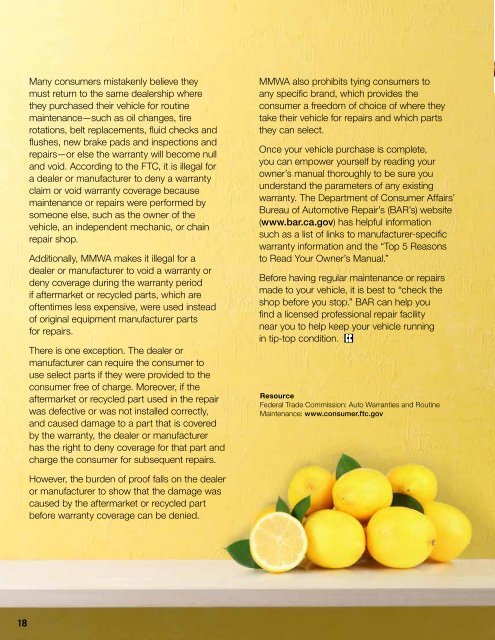spring2018
You also want an ePaper? Increase the reach of your titles
YUMPU automatically turns print PDFs into web optimized ePapers that Google loves.
Many consumers mistakenly believe they<br />
must return to the same dealership where<br />
they purchased their vehicle for routine<br />
maintenance—such as oil changes, tire<br />
rotations, belt replacements, fluid checks and<br />
flushes, new brake pads and inspections and<br />
repairs—or else the warranty will become null<br />
and void. According to the FTC, it is illegal for<br />
a dealer or manufacturer to deny a warranty<br />
claim or void warranty coverage because<br />
maintenance or repairs were performed by<br />
someone else, such as the owner of the<br />
vehicle, an independent mechanic, or chain<br />
repair shop.<br />
Additionally, MMWA makes it illegal for a<br />
dealer or manufacturer to void a warranty or<br />
deny coverage during the warranty period<br />
if aftermarket or recycled parts, which are<br />
oftentimes less expensive, were used instead<br />
of original equipment manufacturer parts<br />
for repairs.<br />
There is one exception. The dealer or<br />
manufacturer can require the consumer to<br />
use select parts if they were provided to the<br />
consumer free of charge. Moreover, if the<br />
aftermarket or recycled part used in the repair<br />
was defective or was not installed correctly,<br />
and caused damage to a part that is covered<br />
by the warranty, the dealer or manufacturer<br />
has the right to deny coverage for that part and<br />
charge the consumer for subsequent repairs.<br />
MMWA also prohibits tying consumers to<br />
any specific brand, which provides the<br />
consumer a freedom of choice of where they<br />
take their vehicle for repairs and which parts<br />
they can select.<br />
Once your vehicle purchase is complete,<br />
you can empower yourself by reading your<br />
owner’s manual thoroughly to be sure you<br />
understand the parameters of any existing<br />
warranty. The Department of Consumer Affairs’<br />
Bureau of Automotive Repair’s (BAR’s) website<br />
(www.bar.ca.gov) has helpful information<br />
such as a list of links to manufacturer-specific<br />
warranty information and the “Top 5 Reasons<br />
to Read Your Owner’s Manual.”<br />
Before having regular maintenance or repairs<br />
made to your vehicle, it is best to “check the<br />
shop before you stop.” BAR can help you<br />
find a licensed professional repair facility<br />
near you to help keep your vehicle running<br />
in tip-top condition.<br />
Resource<br />
Federal Trade Commission: Auto Warranties and Routine<br />
Maintenance: www.consumer.ftc.gov<br />
However, the burden of proof falls on the dealer<br />
or manufacturer to show that the damage was<br />
caused by the aftermarket or recycled part<br />
before warranty coverage can be denied.<br />
18


